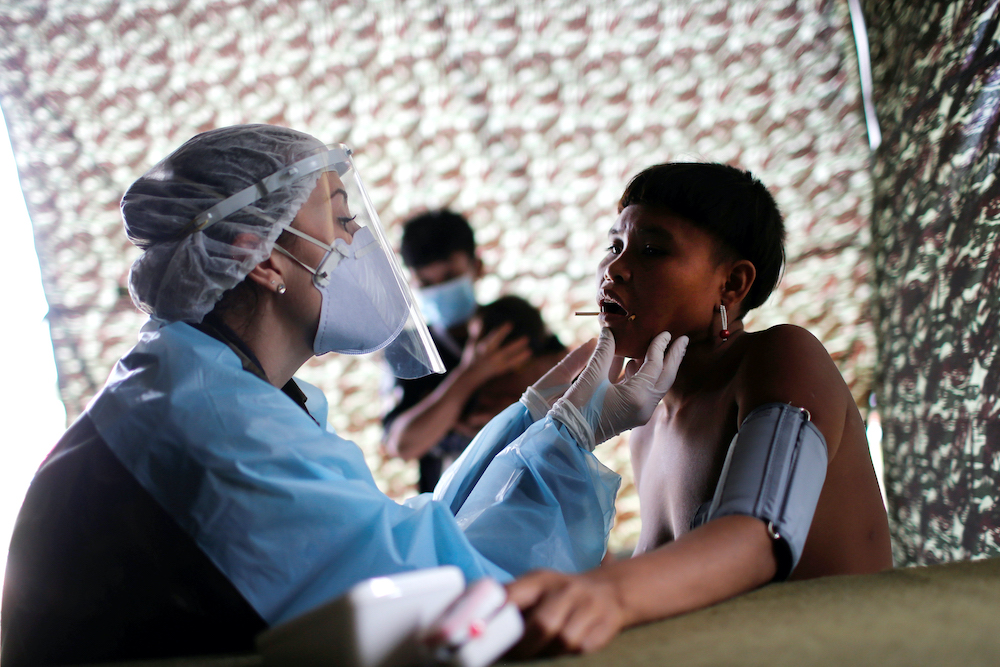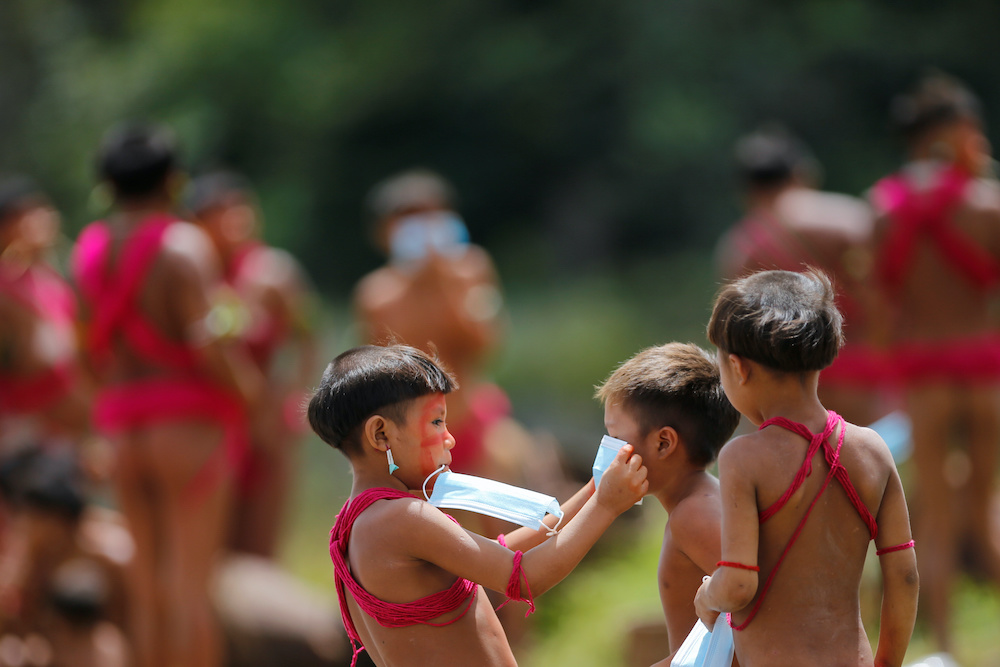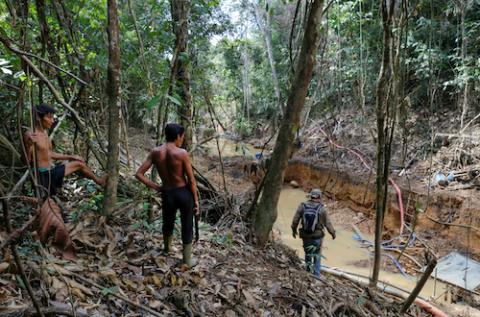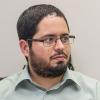
A young Yanomami is examined by a member of a medical team with the Brazilian army in the state of Roraima July 1, 2020. (CNS/Reuters/Adriano Machado)
Since the beginning of the COVID-19 pandemic in Brazil, Catholic organizations have warned that protective measures should be taken to keep the virus away from the country's Indigenous population — or the consequences would be disastrous.
The surge in the number of cases among Indigenous since the end of May appears to demonstrate that the worst has happened.
With at least 367,180 cases of infection and 12,685 deaths, the Amazonian region is one of the epicenters of Brazil's COVID-19 pandemic. The disease is not only impacting large cities such as Manaus and Belém but has also infiltrated many communities in the countryside, including the villages of traditional peoples that live in the rainforest.
The coronavirus has infected at least 6,626 members of Indigenous groups in the region and killed 157 of them. In the whole country, there are at least 9,500 cases involving Indigenous persons, with about 380 deaths, according to the Association of the Indigenous Peoples of Brazil.
Advertisement
The spread of COVID-19 among Indigenous groups reflects a general lack of governmental protection of their rights, said Antônio Cerqueira de Oliveira, executive secretary of the Brazilian bishops' Indigenous Missionary Council (known by its Portuguese acronym CIMI).
"In previous administrations, Indigenous rights were not fully secure … but at least there was some kind of dialogue with those peoples," Oliveira told NCR. "President Jair Bolsonaro has closed all doors and established an anti-Indigenous policy."
Since his 2018 presidential campaign, Bolsonaro has repeatedly criticized the policy of establishing land reservations for Indigenous groups that are able to prove their historic ties with the territory they are claiming. Although it's mandated by the constitution, Bolsonaro has claimed that Indigenous peoples already have too much land in Brazil, and promised that he wouldn't grant any new territory to them.
At the same time, Bolsonaro has declared on various occasions that he would loosen the environmental and legal restrictions for economic activities in the country — especially in the Amazon.
Since he took office in January 2019, there has been an intensification of land invasions and destruction of the rainforest, perpetrated by illegal loggers and miners and by ranchers who want to expand their farming areas. The process often involves violence against Amazonian laborers and Indigenous.
Bolsonaro has also downplayed the severity of COVID-19, even as Brazil has the second-highest number of cases, nearly 1.7 million as of July 8, after the U.S. He tested positive for the disease July 6.
"With the pandemic, the already insufficient number of monitoring agents in the Amazon almost disappeared and invasions quickly increased," said Oliveira. "The intruders are not only destroying the forest and threatening the Indigenous peoples, but they're also taking the virus with them."
Porto Velho Archbishop Roque Paloschi, CIMI's president, said that wildfires set by invaders also have the potential to increase the dissemination of respiratory diseases. "The removal of such intruders from the Indigenous lands is urgent," he told NCR.
But the governmental agency for Indigenous affairs, the National Indian Foundation, seems to be going in the wrong direction. According to Oliveira, the foundation has removed its agents from Indigenous lands that are awaiting official recognition from the government, leaving many peoples unassisted.

Young Yanomami try on protective masks as members of a medical team with the Brazilian army examine members of the tribe in the state of Roraima July 1, 2020. (CNS/Reuters/Adriano Machado)
The protection for isolated Indigenous groups — which live in the rainforest and avoid any contact with non-Indigenous people — has also been severely weakened, said Oliveira. "The doors are wide open for invaders," he said.
Catholic missionaries — at least the ones connected to CIMI — stopped visiting the rural villages at the beginning of the outbreak. They advised Indigenous groups to avoid contact with people from the outside and to remain in their reservations as much as possible.
But eventually, some of the members of the communities go into the city in order to receive their salaries or governmental assistance and to buy groceries. That's when spread of the virus might occur.
"People have not been properly oriented to use hand sanitizers after leaving a store, for instance, or to always wear face masks, at least when they leave their villages," said Fr. Aquilino Tsiruia, a member of the Xavante people in Mato Grosso State.
"The healthcare authorities should have told the Indigenous peoples about it, but they failed to do it," said Tsiruia.
At least 32 Xavante people died from COVID-19, most of them in June. "The local healthcare system is very precarious, with only a handful of ICU beds available," said Tsiruia. "Our people has a considerable population of elders, many of whom with diabetes. Everybody is very frightened."
Reports of a lack of physicians and equipped hospitals abound among the Amazonian Indigenous peoples. According to Oliveira, the healthcare situation has deteriorated since Bolsonaro canceled an agreement with Cuba that allowed hundreds of Cuban doctors to work in remote areas in Brazil.
The program had been created during the administration of left-wing former President Dilma Rousseff and was ideologically targeted by the far-right Bolsonaro.
"In many Indigenous reservations, the Cuban doctors were the only professionals available. Now, there's a total absence of healthcare specialists," said Oliveira.
This is one of the reasons why many Indigenous people report that they have been treating COVID-19 cases with traditional healing herbs and teas.
"If we only count on regular medicines, there won't be enough for everybody," said Fr. Justino Rezende, a member of the Tuyuka people who lives in the city of Santa Isabel do Rio Negro, in Amazonas state.
Rezende came down with COVID-19 in June. "The number of cases here is going up," he said. "Many elderly people are dying."
Given that most villages are near small cities, the most serious cases are often taken to the state capitals, where the hospitals are a little better. Deaths occurring so far away from patients' families lead to other complications.
"The disease is disrupting millennium-long life systems, given that it impedes the practice of very important rituals — especially the funereal ones," explained Sr. Laura Vicuña Manso, a CIMI missionary. "The Indigenous groups feel deeply like they are doing something wrong when they can't perform their traditional rites."
Manso described the despair of a few leaders of the Karitiana people from Rondonia State when the first COVID-19 victim of their village died.
"The healthcare authorities wanted to bury the body in the city," she said. "In the end, after much discussion, we were able to take the body to the village, but they couldn't perform the whole traditional ritual."

Yanomami follow members of Brazil's environmental agency during an operation against illegal gold mining on indigenous land in the heart of the Amazon rainforest. (CNS/Reuters/Bruno Kelly)
Alberto Brazão Góes, a member of the Yanomami people from the village of Maturacá, in the city of São Gabriel da Cachoeira, said that more than 60 people of his community have shown signs of COVID-19, but only two people have died.
"The health professionals told the families not to take the bodies to the village, but they insisted," said Góes. "I persuaded them to break the tradition and do a quick burial. We usually would cry for at least two days and then do a cremation. Fortunately, they agreed."
Paloschi said the impossibility of performing their cultural rites generates serious unbalances in Indigenous societies. "It's a turmoil in their cultural universe," said the archbishop. "This is a situation of real violence against them."
Besides CIMI, local dioceses and parishes have been active in providing help to the Indigenous villages. In São Gabriel da Cachoeira, the diocese is part of a committee to deal with the disease, and one of its buildings is being used to shelter patients during treatment.
"Luckily our region began to fight the pandemic from the start," said Fr. Geraldo Baniwa, who lives in Assunção, an area away from the city center.
"When there's a serious case in my community, the patient can be taken to the city and undergo treatment," he said. "About 80 families live here, and nobody died until now."
Despite the growing numbers of the pandemic in the Amazon, the major cities in the region started to reactivate the economy and to loosen social distancing measures.
"There's a considerable circulation of Indigenous peoples in the cities," said Oliveira. "Such an irresponsible reopening will certainly worsen the situation."
[Eduardo Campos Lima holds a degree in journalism and a doctorate in literature from the University of São Paulo, Brazil. Between 2016 and 2017, he was a Fulbright visiting research student at Columbia University. His work appears in Reuters and the Brazilian newspaper Folha de S. Paulo.]








